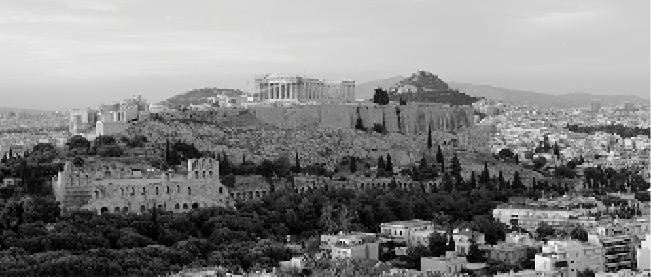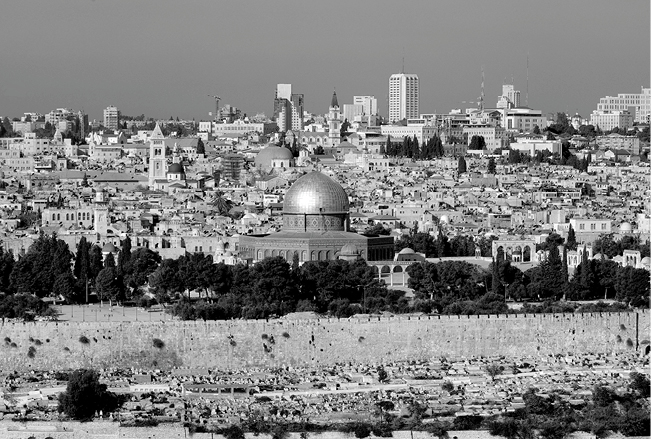Who are you?
If you are part of Western civilization, your cultural ancestors are a tiny monotheistic desert tribe of Israelites and a small city-state in what we now call Greece. Even if you are unaware of this dual heritage, it influences your life every day. The political philosopher Leo Strauss discussed Western civilization’s foundations in his important essay “Jerusalem and Athens,” contained in his collection Studies in Platonic Political Philosophy.
The tradition designated as that of “Athens” is associated with philosophy and with critical exercise of the mind. The tradition linked to “Jerusalem” is associated with monotheism. The two traditions interact, sometimes fuse, and there exists a dynamic tension between them. Many have argued that it is just this tension that has rendered Western civilization so dynamic down through the centuries. On the side of “Athens” you will want to learn something about Homer, who in many ways laid the basis of Greek philosophy, and you will need to meet Plato, Aristotle, the Greek dramatists, historians, architects, and sculptors.
Over in “Jerusalem” you will find the epic account of the career of monotheism as it worked its way out in history. The scriptures, like Homer’s works, have their epic heroes, and, like the Greek tradition they refine and internalize the epic virtues. “Athens” and “Jerusalem” interact, and much flows from the interaction.
You will follow all of this down through the centuries, through Virgil, Augustine, and Dante; in Shakespeare; and in Cervantes, Montaigne, Molière, Voltaire, and Goethe; and on to modernity. “The best that has been thought and said,” Matthew Arnold called it. This is the mind of Europe, said T.S. Eliot, “from Homer to the present.”
I had never heard of the Athens-Jerusalem paradigm in 1956 when I got out of the Navy and returned to Columbia for my PhD. I had graduated from Columbia College in 1952. I was wandering around in Hamilton Hall getting my course cards signed when Lionel Trilling emerged from his office and asked if I would like to teach freshman English. I said yes, and I soon had three sections of freshman composition and a section of Humanities 1-2. The latter has long been required of all freshmen and is consistently voted by Columbia alumni as the most valuable course they have taken at the College.
But that fall, in 1956, I faced an emergency. I had transferred to Columbia in 1950 and had never taken Humanities 1-2. Even worse, the semester had already begun, and my section of Humanities 1 had begun without me (such was the disorganization of the English Department). I had never read the first book assigned, Homer’s Iliad. Thinking fast, I met the class, said hello, outlined Aristotle’s description of tragedy as set forth in his Poetics, and survived by discussing the nature and goals of tragedy and comedy, not acknowledging that this class right now was a perfect example of both.
Teaching the two-semester Humanities 1-2 from 1956 to 1963, when I accepted a position at Dartmouth, ultimately led to the publication of my Smiling Through the Cultural Catastrophe, a trip through the Columbia Humanities 1-2 syllabus with analysis and commentary. This book about Western Civilization came soon after 9/11, so Osama bin Laden became my promoter, and he turned out to be a very good one in fact. Everyone wanted to talk about Western civilization, which was under attack, and I did so on CNN’s “Book Notes,” from its TV studio in Washington, D.C.
The title Smiling Through the Cultural Catastrophe means that we have all the necessary books, but they are not read. As Aleksandr Solzhenitsyn has said, “A people that no longer remembers has lost its soul.” The ORC, Dartmouth’s course book, has the necessary ingredients to avert such a crisis.
I will now move through the necessary syllabus with some sparse commentary.
1. Athens: The Heroic Phase — In the Iliad, with the central character being Achilles, we have not only a compelling narrative, but a form of scripture from which Athenian school boys learned the goal of Arete: excellence of character and nobility of action. Athenian school boys would have discussed Arete in the Iliad and Odyssey and analyzed how characters in each embodied or fell short of Arete. Aristotle provided the winning essay on this in his Ethics with its portrait of the magnanimous man.
2. Athens: Philosophers — Plato wanted to be a “better teacher than Homer,” and in the Republic and the Socratic dialogues he proposed the heroic philosopher Socrates as the new ideal. In a sense Socrates “internalizes” Arete, the heroic pursuit of philosophical truth. If you want to read one Platonic dialogue at Dartmouth, the brief and beautiful Symposium should be the one, giving form to the basis of platonic philosophical idealism. Aristotle was a long-term student at Plato’s Academy, the first university, and left to form his own school, the Lyceum. Dartmouth was founded by Eleazar Wheelock, but its ancestors were the Academy and the Lyceum. Socrates was a heretic in the opinion of the Athenian judges in the Areopagus, who sentenced him to death. There are analogies here with Jesus (Yeshua), who spiritualized Moses’ Ten Commandments and who, for his heresies, also was sentenced to death.
3. Jerusalem: The Heroic Phase — The five books of Moses—Genesis, Exodus, Leviticus, Numbers, Deuteronomy—represent the epic of Jerusalem, Moses as both general and law-giver on Mount Sinai and dying in that magnificent final scene: Moses on Mount Nebo sees the Promised Land in the distance but never crosses the Jordan to reach it. The best place to go for the epic of Jerusalem is Robert Alter, The Five Books of Moses, an excellent translation with definitive footnotes. The epic hero Moses lived around 1250 BC, the approximate date of the siege of King Priam’s Troy, where Achilles was the epic hero.
4. Jerusalem: Jesus — Jesus is a complex figure. Notably, in the Sermon on the Mount, he speaks back over 1200 years to Moses on that other mount, Sinai, and he internalizes or spiritualizes Moses’ Ten Commandments. Jesus explains that we are not to be white-washed tombs, white outside and corrupt within, but we must be pure all the way through—speaking of holiness, or the purified soul. Jesus structures his teachings: “It has been said … but I say.” For example, “You have heard it said ‘do not commit adultery.’ But I tell you that anyone who looks at a woman with lust has already committed adultery in his heart.” Hmmm. But holiness is a “pearl of infinite price,” and when Jesus says, “if your eye offend you, pluck it out,” I think he means it. In practical terms, that might mean secluding oneself in a monastery. I remember reading the gospels with serious attention for the first time in the Columbia Humanities course along with some serious scholarship, and thinking that either this guy was nuts or else he was what he said he was. With Athens and Jerusalem now in place, we can proceed in a more summary manner:
5. Virgil’s Aeneid — Drawing on both the Odyssey and the Iliad, Virgil tells of the voyage of the Trojan Aeneas from the ruined city of Troy to Latium, where he becomes the founder of Rome and, derivatively, of Europe. The concepts of citizenship and duty emerge as themes in this beautiful work.
6. Dante — His Divine Comedy is the great epic of medieval Christianity, synthesizing Athens, Jerusalem, and Amor, the religion of ideal love invented by the medieval troubadours. In his Allegory of Love, C.S. Lewis said that Amor represented the greatest change in human nature since Christianity.
7. Shakespeare — In Smiling Through Cultural Catastrophe, I discuss Hamlet as representative of man. Eliot judged Dante to be the greatest post-classical poet for his concentration, Shakespeare the greatest for extension and variety.
8. Reason: The Enlightenment — For the great works of the Enlightenment, read: Molière’s The Misanthorope and Tartuffe. Superb comedies. We read Voltaire’s Candide in the Humanities class, but that was a mistake. Candide is merely amusing. We should have read Voltaire’s Philosophical Dictionary. As Jacob Burkhardt said, Voltaire’s rationalism “becomes poetic, even mythic” as it challenges orthodoxies in that work; I would add “luminous.” Much needed to be challenged. We also read Hume’s Dialogues, which attacked revealed religion with probability theory. I myself think that faith is intellectually illegitimate unless it acknowledges doubt. And the necessity for doubt means tolerance.
9. Spiritual Exile — As the final work in Humanities 2, we read Dostoyevsky’s Crime and Punishment, a powerful novel, a gateway to the modern world, and also the perfect Columbia novel. Its hero, Raskolnikov, lives in dirty room in St. Petersburg, thinks he is a genius, and commits a gratuitous murder to prove his superiority to mediocrity. The poet Allen Ginsberg and other Beats around Columbia in fact were involved in a murder when I was teaching there. Ginsberg got off with a mental plea, but Mark Van Doren told him that he needed to hear “the clang of iron behind him.”
In Smiling Through Cultural Catastrophe, I added “Faust in Great Neck,” or The Great Gatsby, to the core books of the Western canon. James Gatz pushes towards American possibility, re-invents himself as Jay Gatsby, and tries to defeat the ultimate reality: time.
The main job in getting a college education is to make sure the large essential parts are firmly in place, after which you can build upon them. The courses you need are right there in the ORC and are often surrounded by nonessentials and even outright garbage. Dartmouth will not tell you what the right courses are to get a college education, but then that doesn’t matter—because I have just done so.
This set piece to The Review’s Dartmouth Guide was written by the late Professor Jeffrey Hart.


